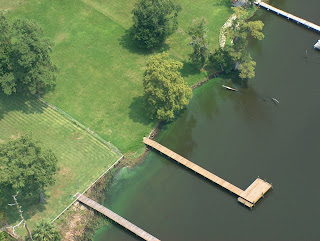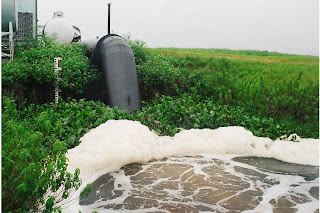
If you haven't already heard, Central Florida is planning to withdraw large amounts of water from the St. Johns River and the lower Ocklawaha. This issues is huge, and it grows daily. We’re busy plowing through hundreds of pages of documents, and there is much more to learn. We will be producing a white paper and/or fact sheets on this topic. Here’s what we know right now:
The St. Johns River Water Management District (SJRWMD) has stated that central Florida has out-stripped the Floridan aquifer’s ability to provide a sustainable drinking water source beyond 2013.
The District has told communities they will have to seek alternative water sources (AWS). The SJRWMD has stated that 155 million gallon days (MGD) can be “safely” removed from the St. Johns River between the headwaters and State Road 44. This number was based upon a study done by a consultant hired by the district. By “safely”, the District means 155 MGD withdrawal will not affect the aquatic health of the river or its ecosystem.
At a July 18 meeting in Orlando, various cities and counties submitted ~ 46 withdrawal projects/proposals vying for the 155 MGD.
Because river water has a high salt or mineral content, most withdrawals will involve reverse osmosis, or RO. A by-product of RO is high mineral content and/or very salty water. Also, RO water is high in nutrients. The byproducts are called “concentrate”.
The SJRWMD has recently started a study to document the problems with concentrate on the river environment—the study will end in a year. RK is concerned SJRWMD could issue numerous withdrawal permits BEFORE the study is complete.
The SJRWMD is also focusing its attention on the lower Ocklawaha River. Although District staff has not set an MFL, minimum flow level, for the Ocklawaha River, the agency is telling counties to expect to be able to withdraw 90 to 108 MGD from the river.
The only county proposing to withdraw water from the River that has a mandatory water conservation plan is Volusia County. None of the other counties or municipalities that are planning water withdrawals has mandatory water conservation programs.
One of the largest water withdrawals, Yankee Lake, is planned in an area just south of the Wekiva Aquatic Preserve! Also, this plant will eventually discharge concentrate into the river.
This current process will only provide drinking water needs until 2025, less than 20 years into the future.
If you are concerned about this process you can contact the Executive Director of the SJRWMD, Kirby Green, at kgreen@sjrwmd.com or 386-329-4262 and Barbara Vergara, Chief of Water Supply, at bvergara@sjrwmd.com or 386-329-4169.
If you want to contact the policy makers of the SJRWMD, the Governing Board, you can send a email c/o Linda Lorenzen, executive assistant, and ask her to forward your correspondence to the board. Her contact is llorenzen@sjrwmd.com.
Thanks again for caring for our beautiful St. Johns.




